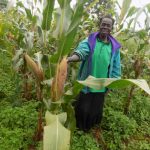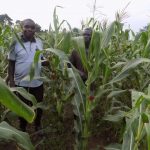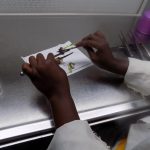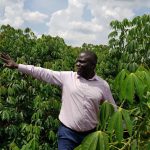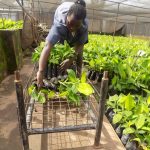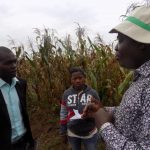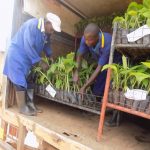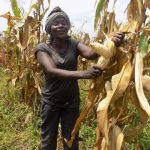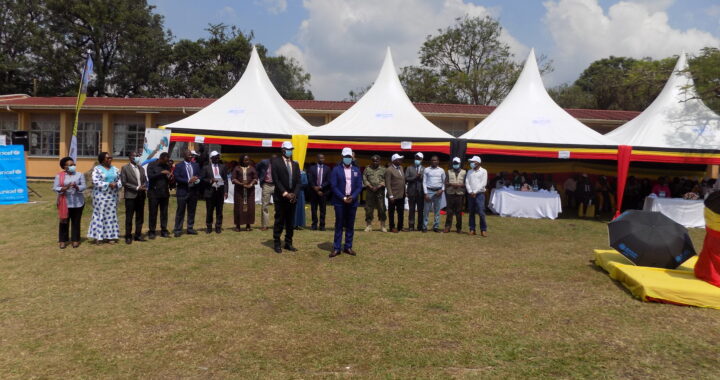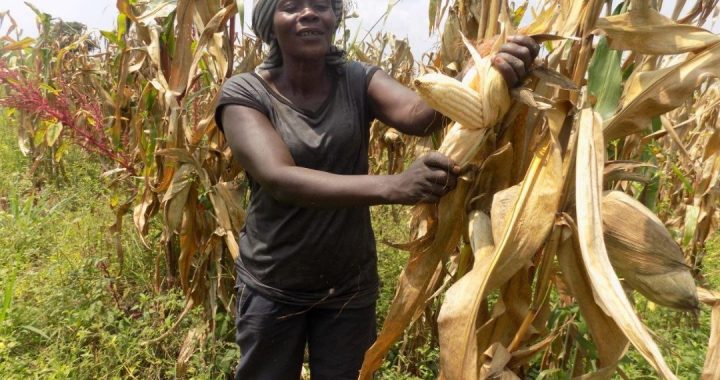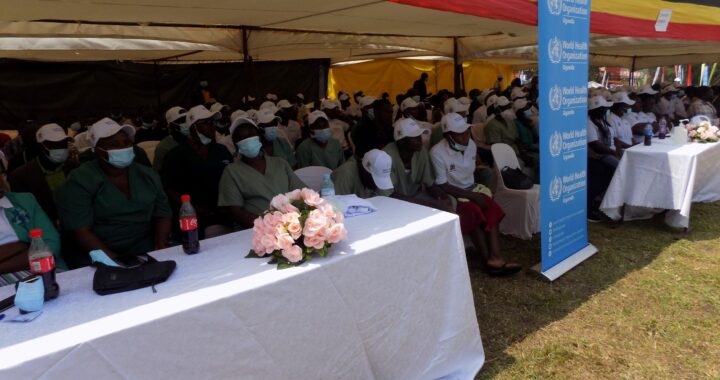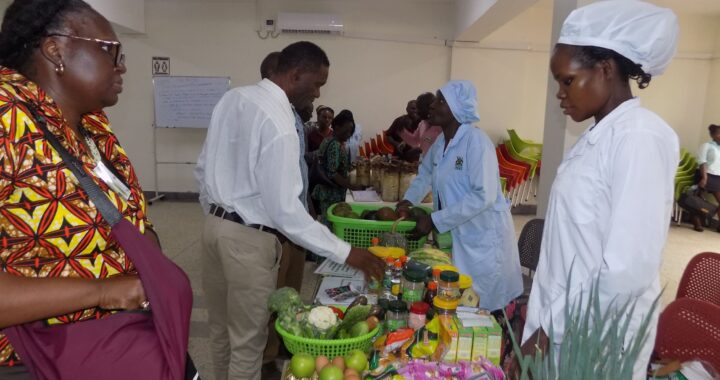An extra income for bee farmer
4 min read
Dr Amulen holding a dry propolis block. Photo by Christopher Bendana
By Christopher Bendana
Samuel Asili, an apiary farmer in Omagara village, Kateta sub county, Serere district in eastern Uganda is a propolis enthusiast. Propolis extraction and process has increased his income from his apiary by 10 percent.
“This is an income from a product I used to throw away,” the 16 beehive apiary owner told ScienceNowMag.
He extracts about one kg of dried propolis from his apiary farm each season (three months) and another of between 20-40 kg of honey in a season (three months). This earns him between UGX 10,000-UGX 15000 from the honey and UGX 30,000 from the propolis.
And the propolis market is there thanks to the research carried out by Deborah Ruth Amulen a researcher at the College of Veterinary Medicine, Animal Resources and Biosecurity, Makerere University.
She invested her time and money in finding alternative uses for bee products. Propolis, a highly medicinal bee product is one such product.
It is a plant resin the bees collect to seal hive cracks and sterilize the beehive. Previously thrown away by farmers due to limited knowledge of its uses, it is a potential industrial product for medicine (cough, wound care, and dental care) and cosmetics among other uses.
Now she has added science to the extraction of medicinal powder from the raw propolis (a plant resin). Raw propolis is collected, crashed, soaked in acceptable solvent, concentrated, and dried using laboratory methods to generate a medicinal powder. This method is better compared to the use of tinctures (propolis soaked in ethanol) where concentrations of the active ingredient remain unknown.
How did it all start
Amulen’s journey started at Soroti Catholic Diocese (SOCADIDO) where she was a dairy manager. She had a side business of packaging honey and selling it as discovered the opportunities bees provide in changing people’s livelihoods through the whole value chain. Her first degree is in animal production and technology and management from Makerere University
“I found the business easy to start as it required small capital. I did it as a side hustle and earned fair money.” She revealed to ScienceNowMag. “I thought of using it to change the livelihoods of society.”
And she was lucky. A rainy day came in 2008 when VLIR UOS sponsored her for a short course, Bee Keeping for Poverty Alleviation at Ghent University in Belgium, which introduced her to the benefits of beekeeping and the potential of their products to alleviate poverty. Also enhanced her practical skills in apiary management.
“The fear of the bees evaporated,” she boasts. The professors exposed me to the bees. We also toured different businesses in the bee value chain.”
Then came the prizes including the Rotary Badge from the city Wetteren in Belgium after her presentation, how to enhance livelihoods through the selling of honey. The Rotary Club also donated to her a machine that detects moisture in the honey, a very important tool in quality assurance.
This course enhanced her interest in the bee value chain and she now focuses on both business and research.
Her interest grew. She decided that more research was needed on the people. She went for a doctorate in applied biological sciences focusing on applied beekeeping which was co-sponsored by the Commonwealth and Erasmus Mundus European Union scholarship program.

This gave her the much-needed skills to develop a strategy for improved honey production in Ugandan communities. One of such strategies was to increase the niche branding of products and diversify from making only honey and beeswax to high-value medicinal products such as propolis.
She also found out that farmers got an additional income of seven percent of their annual income, which would easily increase to 12 percent.
Breakthrough
The rainy day came in 2018 when the Uganda National Council for Science and Technology (UNCST) placed an innovation funding call for local innovators in the local newspaper (New Vision) She applied, and she was one of the few selected.
She received UGX100 million for her study Commercialization of Propolis Powder and Infused Tea bags for Improved Health and Income in Uganda

She studied the extraction process, the value, and the practices along it.
She also developed several porotypes but zeroed in on this one because it is better.
Finally, she held a consumer survey of the propolis tea at Forest Mall in Kampala in 2020 where about 200 people attended and left with satisfaction.
A second grant for commercialization came in 2021. She has been engaging, and encouraging members of the Uganda Apiculture Development Organisation (TUNADO) to encourage investment in the propolis value chain.
Products ready for commercialization
The research team is working on product certification and approval from the Uganda Bureau of Standards including for propolis tea.
Geoffery Sempiri, the coordinator Science Granting Councils Initiative UNSCT says Amulen’s project was selected because of its uniqueness and innovative approach. It also included many people in the value chain from the women and youth engaged in managing the beehives to the those involved in the processing
“It looked beyond honey, the common bee product. It explores something new, propolis and venom.” It also brought on board a private sector partner, the Apiculture Development Organization.”
Dickson Biryomumaisho, the executive director of TUNADO says some of their members are fascinated by the improved technology like the crusher used in crushing the dry block that contains propolis.
And the apiary farmers can extract more propolis if they apply the right methods.

“They can collect up to 300grams per beehive in a season” says Amulen. “We are exploring how we can focus on the stingless bee which does produce more propolis.”


